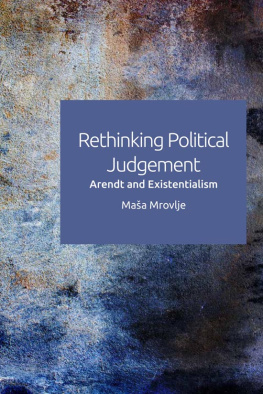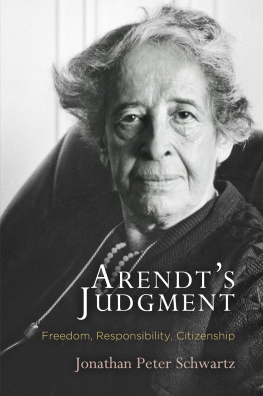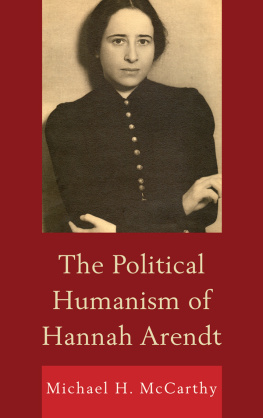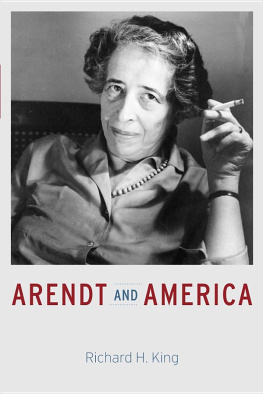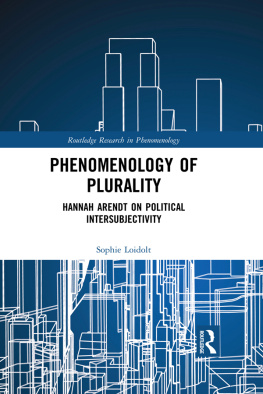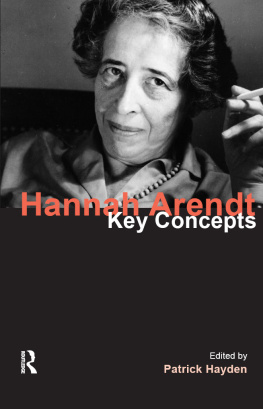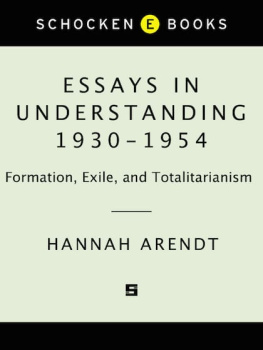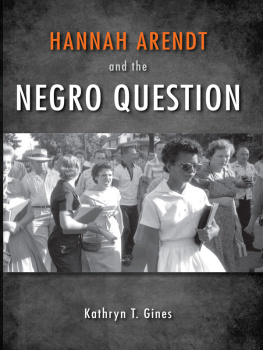
Rethinking Political Judgement
Rethinking Political Judgement
Arendt and Existentialism
Maa Mrovlje
EDINBURGH
University Press
Edinburgh University Press is one of the leading university presses in the UK. We publish academic books and journals in our selected subject areas across the humanities and social sciences, combining cutting-edge scholarship with high editorial and production values to produce academic works of lasting importance. For more information visit our website: edinburghuniversitypress.com
Maa Mrovlje, 2019
Edinburgh University Press Ltd
The Tun Holyrood Road
12(2f) Jacksons Entry
Edinburgh EH8 8PJ
Typeset in 11/13 Adobe Sabon by
IDSUK (DataConnection) Ltd, and
printed and bound in Great Britain.
A CIP record for this book is available from the British Library
ISBN 978 1 4744 2999 3 (hardback)
ISBN 978 1 4744 3715 8 (webready PDF)
ISBN 978 1 4744 3716 5 (epub)
The right of Maa Mrovlje to be identified as the author of this work has been asserted in accordance with the Copyright, Designs and Patents Act 1988, and the Copyright and Related Rights Regulations 2003 (SI No. 2498).
Contents
Acknowledgements
This book began its journey as a PhD research project at the University of St Andrews. My doctoral study would not have been possible without the support of the St Andrews School of International Relations and the Slovene Human Resources Development and Scholarship Fund. I am highly indebted to my colleagues on the International Political Theory programme for their scholarly dedication, their intellectual openness and generosity of spirit. My greatest thanks go to Patrick Hayden, whose illuminating way of thinking and love for the thinkers addressed in this book has had a formative influence and continues to inspire. For the opportunity to study with him, for his invaluable guidance, and his persistent care and encouragement, I am forever grateful. I also thank Gabriella Slomp, Anthony Lang and Robert Fine for their attentive reading, important insights and supportive words at different stages of the project.
The thesis matured into book form during my postdoctoral research on the Greyzone project at the University of Edinburgh. I consider myself extremely fortunate to be able to work with Mihaela Mihai, whose creativity and warmth have been an inextinguishable source of engaging new ideas and contributed significantly to building my confidence as a scholar. For her thoughtful comments and good counsel, for her care and support throughout the revision process, I cannot thank her enough. To her, too, I owe my eternal gratitude. The colleagues at the School of Social and Political Science have provided a vibrant and welcoming intellectual environment, good companionship and many stimulating conversations, for which I cordially thank them. The book was completed with the support of the European Commission, ERC Starting Grant 637709-GREYZONE.
Jenny Daly, David Lonergan and Camilla Rockwood at Edinburgh University Press were exemplars of fine editorship and professionalism. I am most grateful as well to the four anonymous reviewers for their careful consideration and valuable suggestions for improvement.
My very special thanks go to Gisli Vogler for generously reading the whole manuscript and for his discerning comments. His love and steadfast support, his comfort and good humour sustained me when it mattered most.
Many friends have been there for me, offering their understanding, consolation and advice. For their friendship I am especially grateful to Ana, Nina, Polona and my cousin Luka it has been one of their gifts to be able to turn the smaller or bigger tragedies of life into occasions for trust and laughter.
Finally, I wish to express my deepest gratitude to my parents and my late grandmothers whose unconditional love, affection and support elude proper expression in words. They have been my shelter into which to retreat and an example from which to begin. Nothing would matter without them. To them, I dedicate this book.
Parts of appear in Beyond Nussbaums Ethics of Reading: Camus, Arendt, and the Political Significance of Narrative Imagination, The European Legacy 24:2 (2019); published online: 8 November 2018, DOI: 10.1080/10848770.2018.1540514. I thank the publishers for their permission to reproduce this material.
Introduction
The [modern] loss of standards [...] is a catastrophe in the moral world only if one assumes that people are actually incapable of judging things per se, that their faculty of judgement is inadequate for making original judgements, and that the most we can demand of it is the correct application of familiar rules derived from already established standards.
Hannah Arendt, The Promise of Politics
How are we to reinvigorate the human capacity for political judgement as a practical activity capable of confronting the plural and ambiguous character of our postfoundational world? In the face of pervasive injustice and suffering that continuously confound our moral expectations, it is easy to feel overwhelmed and seek solace in despair. More often than not, our judgements and actions seem obliterated under the weight of larger forces and processes, to the point of making the most steadfast pursuit of moral ideals end in disaster. Even though increasingly interconnected across temporal and spatial boundaries, we hit upon walls of difference, ideological division and hatred. These quandaries foreground political judgement as a topic of fundamental existential import, pertaining to the meaning of our lives and our relationship to the world and others. While political judgement has of late assumed increasing prominence in political theory, the questions of its concrete, human reality and significance remain obscured under the preoccupation with proper standards or grounds. It is now more than fifty years since another generation of thinkers awarded these questions the status of utmost philosophical relevance. Responding to their own horizon of betrayed hopes for universal human emancipation, twentieth-century philosophies of existence approached the dilemmas of political judgement as they are lived, in the ambiguity of a particular historical situation that cannot be congealed in an abstract system of rules. In our present era of uncertainty and disillusion, this book seeks to reclaim their voice, focusing in particular on the work of Jean-Paul Sartre, Simone de Beauvoir, Albert Camus and Hannah Arendt.
Part of a highly variegated intellectual tradition, the four thinkers are distinguished for their particularly bold insertion into history. Sartre, Beauvoir and Camus are often regarded as forming the definitive expression of the twentieth-century existentialist movement. Even though he denounced the label, Camus shared with Sartre and Beauvoir the engaged tone and import of existential philosophising, as well as a steadfast commitment to the social and political concerns of their age. Marking the height of existentialisms intellectual and cultural influence, the three thinkers could indeed be said to have crossed the frontier from the Academy into the world at large (Barrett 1990: 9). Hannah Arendts thought, in contrast, remains subject to contested categorisations. Nevertheless, despite her equivocal assessment of Existenz philosophy, her thinking manifests a deep-seated existential commitment to bringing political thinking back to the realm of lived experience (Hinchman and Hinchman 1984: 183). Indeed, it is Arendts rethinking of the human judging ability as a reflective practice of engaging the particularity of the world that highlights political judgement as an activity in which the meaning of being human itself is at stake bringing into view the prescient political relevance of the existentialists perspective. This book delves into the four thinkers awareness of the moral and political crisis in modernity and their vigilant assumption of the situated, worldly condition of political judgement and action. In their perspective it discerns a valuable prism through which to take up the contemporary impasse of political judgement devoid of metaphysical guarantees.
Next page
